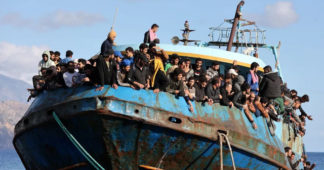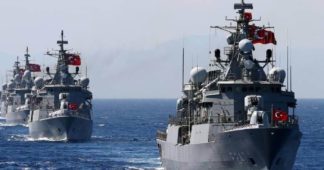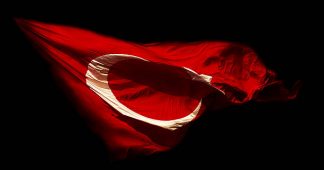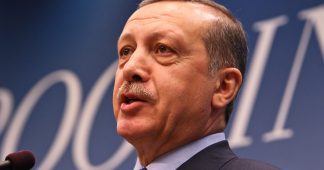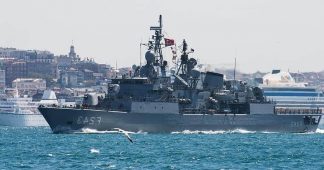Sarantis Michalopoulos and Sofia Mandilara
Jul 2, 2025
Greece is facing a sharp spike in migrant arrivals from Libya just as Ankara and Tripoli step up energy exploration near Crete – fuelling fears of geopolitical coercion and escalating tensions in the eastern Mediterranean.
ATHENS – More than 5,000 migrants from Libya have reached the shores of Crete and Gavdos since the beginning of June – prompting European Commission chief Ursula von der Leyen to dispatch her migration commissioner to the region.
As temperatures soar, the timing of the arrivals coincides with an agreement between Turkey and Libya to launch seismic surveys south of Crete aimed at finding energy riches. The issue could quickly escalate in Athens – with Greece’s ruling New Democracy party reeling from a scandal involving EU funds.
Tensions between the three countries date back to 2019, when Ankara and Libya’s internationally recognised government in Tripoli signed a memorandum of understanding establishing their exclusive economic zones (EEZs) in the Mediterranean Sea.
The deal, which completely ignores the existence of Crete and has been condemned by the EU as illegal, grants the two countries rights to seabed resources.
The Libya-Turkey rapprochement is not a diplomatic coincidence: Turkey doesn’t recognise that Greek islands have EEZ status, contrary to the International Sea Law, which Ankara has not ratified. With the Libya deal, Turkey wants to set a legal precedent in the region.
In response, Greece signed a competing maritime agreement with neighbouring Egypt. As illustrated in the map below, the maritime zones of the four countries clash, making the situation in the Mediterranean region highly complex.
Moreover, Athens sought help from the opposition faction in Libya: Moscow-backed Khalifa Haftar, the Benghazi-based commander of the Libyan National Army, which controls the eastern part of the country.
Initially, Haftar rejected the Turkish-Libyan MoU. However, in early June, press reports suggested that Haftar might be reconsidering his position after an approach by Ankara, whose geopolitical influence in the wider region has grown following the return of Donald Trump to the White House.
Crisis management
Diplomatic sources in Athens have attributed Libya’s recent migration pressure to a Greek government decision to publish a call for tenders for exploration and exploitation licenses for offshore blocks south of Crete – an area in which U.S. energy giant Chevron has expressed interest.
An EU diplomat told Euractiv, on condition of anonymity, that there are indications Libya may be trying to weaponise migration to serve joint political objectives with Ankara. “But it must not be ignored that the Libyan government does not have effective control over the entire country, especially on local authorities, which often collaborate with smugglers,” the diplomat added.
This would not be the first time a third country has weaponised migration against the EU. Turkey did so in 2020 against Greece, and Russia has done the same on several occasions against Eastern European countries as part of a program experts describe as hybrid warfare.
The European Commission estimates there has been a 173% rise in Libyan migrant arrivals into Greece.
With Europe’s memories of past crises still fresh, Commission chief Ursula von der Leyen immediately tasked Migration Commissioner Magnus Brunner with meeting Libyan authorities – both in the west and the east – at the beginning of this month, with 8 July touted as a potential date.
The plan is for Brunner to be accompanied by the migration ministers of Greece and Italy.
Sotiris Roussos, a professor of international relations at the University of Peloponnese, argues that the timing of events matters less than the underlying objectives of Libya and, possibly, Turkey.
“The Libyan government, which effectively controls Tripoli and surrounding areas, wants to demonstrate its ability to exploit resources so that it can play a distributive role in the future domestic balance of power,” Roussos said.
The professor added that Haftar, who is “under Russian influence,” does not appear to be obstructing this cooperation between Turkey and the Tripoli government.
Socialist PASOK lawmaker Michalis Katrinis told Euractiv that the incidents are interconnected and pose “serious risks.” He accused the conservative government of being unwilling to exert pressure on Libya via EU funding mechanisms and called on Brussels to take decisive action.
“It is inconceivable that Europe would finance a country that directly challenges the sovereign rights of an EU member state,” he said.
The government is considering suspending all asylum applications from people arriving from Libya, while two Greek frigates have begun patrolling south of Crete.
We remind our readers that publication of articles on our site does not mean that we agree with what is written. Our policy is to publish anything which we consider of interest, so as to assist our readers in forming their opinions. Sometimes we even publish articles with which we totally disagree, since we believe it is important for our readers to be informed on as wide a spectrum of views as possible.
